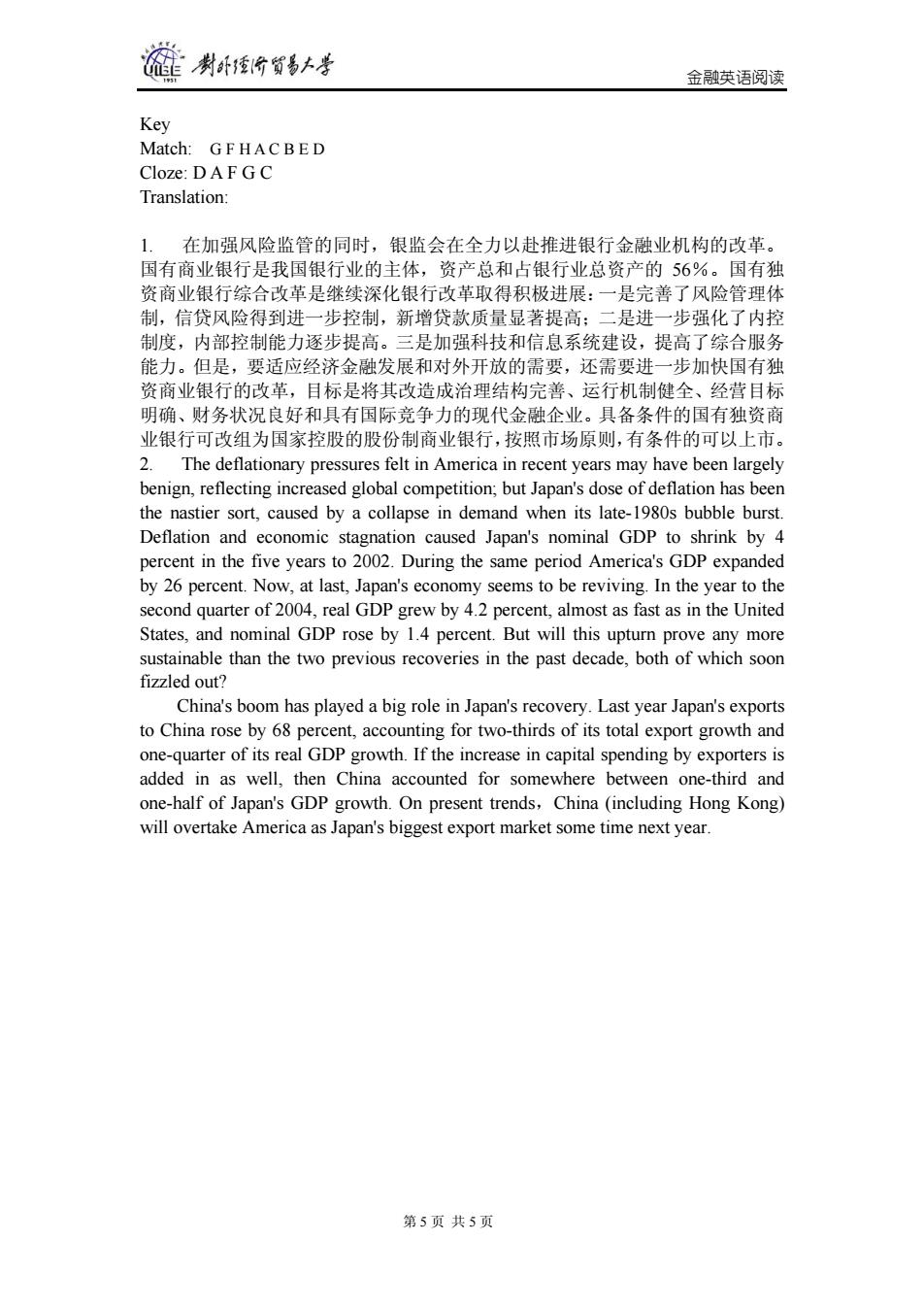正在加载图片...

”制卧价贸易+考 金融英语阅读 Key Match:GFHAC BE D Cloze:DAFG C Translation: 1.在加强风险监管的同时,银监会在全力以赴推进银行金融业机构的改革。 国有商业银行是我国银行业的主体,资产总和占银行业总资产的56%。国有独 资商业银行综合改革是继续深化银行改革取得积极进展:一是完善了风险管理体 制,信贷风险得到进一步控制,新增贷款质量显著提高:二是进一步强化了内控 制度,内部控制能力逐步提高。三是加强科技和信息系统建设,提高了综合服务 能力。但是,要适应经济金融发展和对外开放的需要,还需要进一步加快国有独 资商业银行的改革,目标是将其改造成治理结构完善、运行机制健全、经营目标 明确、财务状况良好和具有国际竞争力的现代金融企业。具备条件的国有独资商 业银行可改组为国家控股的股份制商业银行,按照市场原则,有条件的可以上市。 2.The deflationary pressures felt in America in recent years may have been largely benign,reflecting increased global competition;but Japan's dose of deflation has been the nastier sort,caused by a collapse in demand when its late-1980s bubble burst. Deflation and economic stagnation caused Japan's nominal GDP to shrink by 4 percent in the five years to 2002.During the same period America's GDP expanded by 26 percent.Now,at last,Japan's economy seems to be reviving.In the year to the second quarter of 2004,real GDP grew by 4.2 percent,almost as fast as in the United States,and nominal GDP rose by 1.4 percent.But will this upturn prove any more sustainable than the two previous recoveries in the past decade,both of which soon fizzled out? China's boom has played a big role in Japan's recovery.Last year Japan's exports to China rose by 68 percent,accounting for two-thirds of its total export growth and one-quarter of its real GDP growth.If the increase in capital spending by exporters is added in as well,then China accounted for somewhere between one-third and one-half of Japan's GDP growth.On present trends,China(including Hong Kong) will overtake America as Japan's biggest export market some time next year. 第5页共5页金融英语阅读 第 5 页 共 5 页 Key Match: G F H A C B E D Cloze: D A F G C Translation: 1. 在加强风险监管的同时,银监会在全力以赴推进银行金融业机构的改革。 国有商业银行是我国银行业的主体,资产总和占银行业总资产的 56%。国有独 资商业银行综合改革是继续深化银行改革取得积极进展:一是完善了风险管理体 制,信贷风险得到进一步控制,新增贷款质量显著提高;二是进一步强化了内控 制度,内部控制能力逐步提高。三是加强科技和信息系统建设,提高了综合服务 能力。但是,要适应经济金融发展和对外开放的需要,还需要进一步加快国有独 资商业银行的改革,目标是将其改造成治理结构完善、运行机制健全、经营目标 明确、财务状况良好和具有国际竞争力的现代金融企业。具备条件的国有独资商 业银行可改组为国家控股的股份制商业银行,按照市场原则,有条件的可以上市。 2. The deflationary pressures felt in America in recent years may have been largely benign, reflecting increased global competition; but Japan's dose of deflation has been the nastier sort, caused by a collapse in demand when its late-1980s bubble burst. Deflation and economic stagnation caused Japan's nominal GDP to shrink by 4 percent in the five years to 2002. During the same period America's GDP expanded by 26 percent. Now, at last, Japan's economy seems to be reviving. In the year to the second quarter of 2004, real GDP grew by 4.2 percent, almost as fast as in the United States, and nominal GDP rose by 1.4 percent. But will this upturn prove any more sustainable than the two previous recoveries in the past decade, both of which soon fizzled out? China's boom has played a big role in Japan's recovery. Last year Japan's exports to China rose by 68 percent, accounting for two-thirds of its total export growth and one-quarter of its real GDP growth. If the increase in capital spending by exporters is added in as well, then China accounted for somewhere between one-third and one-half of Japan's GDP growth. On present trends,China (including Hong Kong) will overtake America as Japan's biggest export market some time next year